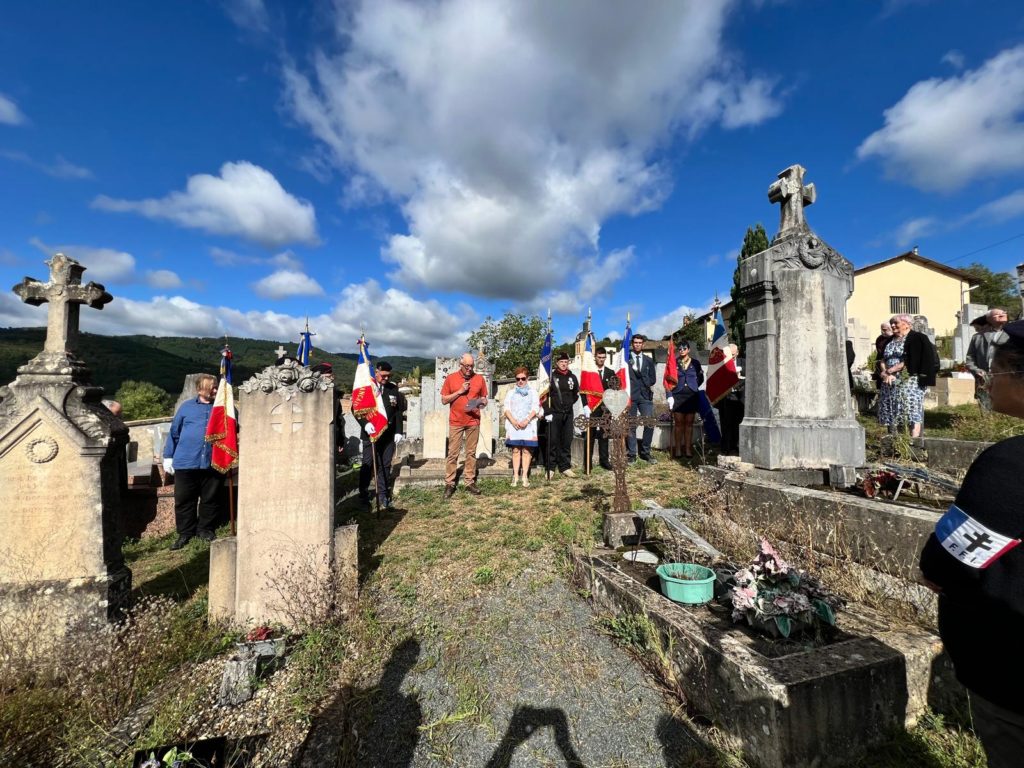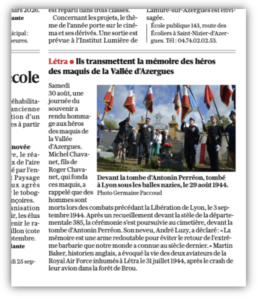On Saturday, August 30, 2025, I had the privilege of being invited by Les Amicale des Anciens des Maquis de la Vallée d’Azergues to pay homage to Flying Officers John Christie and Dennis Kieran Flaherty at their Commonwealth War Grave in Létra.
It was a tremendous honour, and I extend my heartfelt thanks to Michel Chavanet, President of the Amicale, as well as to Bruno Maire of Le Souvenir Français, for granting me this opportunity to share in their remembrance.

On the night of July 26 to 27, 1944, a violent storm swept across Europe. While the Allies were advancing slowly through northern France, it became crucial to cut off the Nazi army’s supply routes. The bombing of Givors, therefore, had to go ahead, despite challenging flying conditions and well beyond the usual range of the aircraft. To avoid friendly fire, the crews had to take a long detour over the English Channel, entering France over Brittany. Each plane, each crew, was pushed to its limits.
The Mosquito DZ636 was designated as MARKER No. 3. The operations log records that its crew, made up of two men, never returned.
The navigator was John Christie, from Brechin, Scotland. He joined the Royal Air Force in 1934, at the age of 23, and from 1939 to May 1940, served as a sergeant observer/navigator, stationed at Poix in Picardy with the 53rd Squadron. On May 11, 1940, his Bristol Blenheim was shot down behind enemy lines in Belgium. Seriously wounded, Christie nevertheless managed to return to the United Kingdom, accomplishing what can only be described as a feat of courage and ingenuity.
In June 1944, he joined 627 Squadron of Mosquitos as a navigator officer. Drawing on his experience, he was paired with a younger and less seasoned pilot, Officer Dennis Kieran Flaherty, from Bradford, in northern England. Flaherty had enlisted in September 1940 and was commissioned as an officer in July 1943. His career as a pilot began in the spring of 1944, and after training on the Mosquito, he was posted to the 627th Squadron in June. On July 26, 1944, he participated in his first operational mission, which would also be his last.
As for the exact circumstances of the loss of Mosquito DZ636, they remain uncertain. There is no evidence that it was shot down; it is more likely that it succumbed to icing, a navigation failure, lightning, or even a mid-air collision. Whatever the cause, the two airmen lost contact very early in the mission. Even so, they continued on their way, in what one surviving pilot described as one of the most gruelling and perilous eight-hour flights he had ever experienced.
Without a doubt, Officers Flaherty and Christie died as heroes. Though they fell alone on a remote hillside, they were received in death with respect and dignity by the inhabitants of Letra and the surrounding villages. Their memory will be forever honoured.

